have、havegot的用法【通用】.doc
have与have got的用法
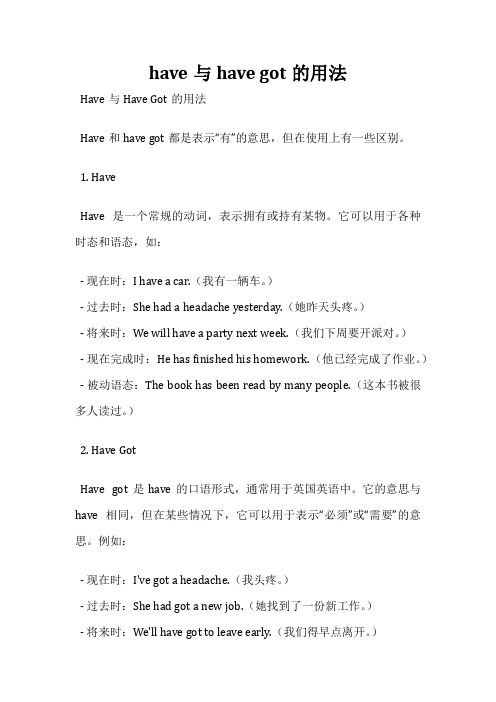
have与have got的用法Have与Have Got的用法Have和have got都是表示“有”的意思,但在使用上有一些区别。
1. HaveHave是一个常规的动词,表示拥有或持有某物。
它可以用于各种时态和语态,如:- 现在时:I have a car.(我有一辆车。
)- 过去时:She had a headache yesterday.(她昨天头疼。
)- 将来时:We will have a party next week.(我们下周要开派对。
)- 现在完成时:He has finished his homework.(他已经完成了作业。
) - 被动语态:The book has been read by many people.(这本书被很多人读过。
)2. Have GotHave got是have的口语形式,通常用于英国英语中。
它的意思与have相同,但在某些情况下,它可以用于表示“必须”或“需要”的意思。
例如:- 现在时:I've got a headache.(我头疼。
)- 过去时:She had got a new job.(她找到了一份新工作。
)- 将来时:We'll have got to leave early.(我们得早点离开。
)- 现在完成时:He's got his homework done.(他完成了作业。
)- 表示必须:You've got to be careful.(你必须小心。
)需要注意的是,have got在美国英语中不常用,美国人通常使用have。
3. 区别虽然have和have got的意思相同,但在使用上有一些区别。
例如:- 疑问句:在疑问句中,have通常用于正式场合,而have got则用于非正式场合。
例如:Do you have a pen?(你有笔吗?)(正式)Have you got a pen?(你有笔吗?)(非正式)- 否定句:在否定句中,have通常用于所有情况,而have got则用于口语中。
have和havegot的用法区别

have和havegot的用法区别have 作某些意义时,与have got 通用,have got 是英国英语。
一、两者在肯定句、否定句和疑问句中的形态不一样1、肯定句have: 主语+ have/hashave got: 主语+ have got ('ve got) / has got ('s got)2、否定句have: 主语+ do not (don't) / does not (doesn't) + havehave got: 主语+ have not (haven't) / has not (hasn't)3、一般疑问句have: Do / Does + 主语+ have?have got: Have / has + 主语+ got?二、两者的共同意义,此时两者通用1、讨论拥有的东西,意为“有,持有,占有”,通常不用进行时,例如:I have/have got a new mobile phone.我有一部新手机。
Paul doesn’t have/hasn’t got a car.保罗没有汽车。
2、讨论与别人的关系,意为“有”,通常不用进行时,例如:Jane has/has got a brother.简有一个哥哥。
He has/has got three children.他有三个孩子。
3、讨论性质,特征,意为“显示出,带有”,通常不用进行时,例如:She has/has got blue eyes.她有一双蓝眼睛。
The house has/has got gas-fired central heating.这所房子有燃气中央供暖系统。
4、讨论生病或暂时的状态,意为“患…,有…”,通常不用进行时,例如:I have/ I’ve got a cold.我感冒了。
They have/have got a problem.他们有麻烦了。
have got和have的用法
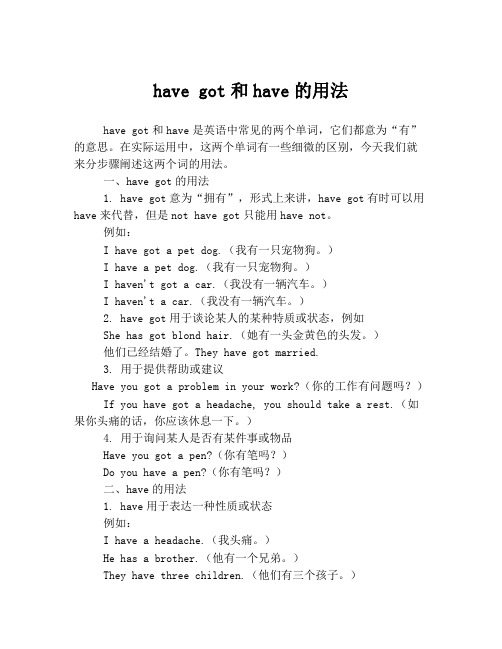
have got和have的用法have got和have是英语中常见的两个单词,它们都意为“有”的意思。
在实际运用中,这两个单词有一些细微的区别,今天我们就来分步骤阐述这两个词的用法。
一、have got的用法1. have got意为“拥有”,形式上来讲,have got有时可以用have来代替,但是not have got只能用have not。
例如:I have got a pet dog.(我有一只宠物狗。
)I have a pet dog.(我有一只宠物狗。
)I haven't got a car.(我没有一辆汽车。
)I haven't a car.(我没有一辆汽车。
)2. have got用于谈论某人的某种特质或状态,例如She has got blond hair.(她有一头金黄色的头发。
)他们已经结婚了。
They have got married.3. 用于提供帮助或建议Have you got a problem in your work?(你的工作有问题吗?)If you have got a headache, you should take a rest.(如果你头痛的话,你应该休息一下。
)4. 用于询问某人是否有某件事或物品Have you got a pen?(你有笔吗?)Do you have a pen?(你有笔吗?)二、have的用法1. have用于表达一种性质或状态例如:I have a headache.(我头痛。
)He has a brother.(他有一个兄弟。
)They have three children.(他们有三个孩子。
)2. have和has用于构成现在完成时态,表示“已经完成”,例如:I have finished my homework.(我已经完成了我的家庭作业。
)She has read this book before.(她以前读过这本书。
小学语法 Have got 和Has got 的用法

have\has got的用法Have got\has got和have\has的区分1.在只含有have\has的句子中,变否定句及疑问句要用do\does。
I have a pen. 否:I don't have a pen. 问:Do you have a pen?He has a pen. 否:He doesn't have a pen. 问:Does he have a pen?2.在句子中遇到have\has got 时,直接用have \ has 进行句型转换。
I have got a pen. 否:I haven't got a pen. 问:Have you got a pen?He has got a pen. 否:He hasn't got a pen. 问:Has he got a pen?一、用have got或has got填空。
1.I ________ a cat.2.He __________ a dog.3.She __________ long hair.4.We __________ a big house.5.They __________ a happy family.6.It __________ a short tail.7.You __________ a good teacher.8.Elva __________ two big eyes.9.Tom __________ a red pen.10.My mother __________ a beautiful nose.11.Cats __________ four legs.12.Dogs __________ two ears.二、have got 和 has got 的否定形式填空1. Lisa __________ a lovely cat.2. We __________ a beautiful garden.3. They ___________ many books.4. Miss Green ____________ big eyes.5. I __________ a turtle. My sister ____________ a turtle, too.6. My father and mother ___________ a nice house.7. My father ______________ a red shirt.8. You __________ a large apple.9. The girl ____________ three uncles.10. The girls ____________ three uncles.三、have got 和 has got 的一般疑问形式填空1. ________ you ________ a red dress? No, I ____________ a blue dress.2. ________ Tom _______ two aunts? Yes, he ___________ two aunts.3. ________she ____________ a small dog?4. The dog is lovely. ________it ___________ a small nose and big eyes?5. ________Mary ____________ a pet. Yes,she________a cat?6. ________the dog ____________ a big mouth? No, it________.7. ________Tom and I________ a football? Yes,we ________.8. ________your sisters________ big eyes? No,they ________.9. ________they ________ five trains? No, they ________.10.________he ________ a big bedroom? Yes, he ________.四、句型转换。
have和have got和there be 等相近词的辨析
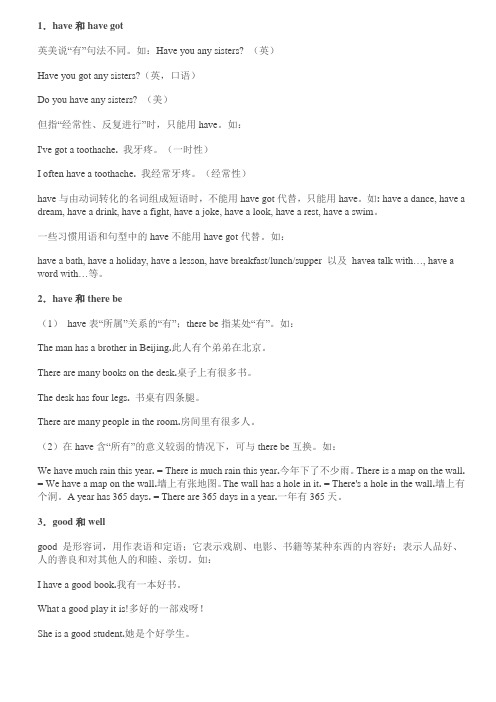
1.have和have got英美说“有”句法不同。
如:Have you any sisters? (英)Have you got any sisters?(英,口语)Do you have any sisters? (美)但指“经常性、反复进行”时,只能用have。
如:I've got a toothache.我牙疼。
(一时性)I often have a toothache.我经常牙疼。
(经常性)have与由动词转化的名词组成短语时,不能用have got代替,只能用have。
如: have a dance, have a dream, have a drink, have a fight, have a joke, have a look, have a rest, have a swim。
一些习惯用语和句型中的have不能用have got代替。
如:have a bath, have a holiday, have a lesson, have breakfast/lunch/supper 以及havea talk with…, have a word with…等。
2.have和there be(1)have表“所属”关系的“有”;there be指某处“有”。
如:The man has a brother in Beijing.此人有个弟弟在北京。
There are many books on the desk.桌子上有很多书。
The desk has four legs.书桌有四条腿。
There are many people in the room.房间里有很多人。
(2)在have含“所有”的意义较弱的情况下,可与there be互换。
如:We have much rain this year. = There is much rain this year.今年下了不少雨。
have got has got 的用法

在句子中怎样缩写呢? I've got a nice coat. You've got a letter from New York. She's got a pet dog.
A、否定句:在Have或Has后加not,缩写为 Haven’t got 或Hasn’t got. I haven't got a computer. He hasn't got a TV. B、疑问句:把Have或Has提前. Have you got a computer? Has he got a TV?
以have/has got开头的一般疑问句的答语: 肯定回答:Yes,主语+have/has. 否定回答:No,主语+haven't/hasn't. 例如:Have you got a computer? Yes,I have./No,Igot的用法
沁阳市实验小学
刘爽
have/has got句型:它表示某物归某人所有,是一种所 属关系,主语为人。 has got 的主语是第三人称单数,have got 的主语是 除单三以外的其它人称。
I have got a nice coat. Daming has got a Chinese dragon kite. You have got a letter from New York.
(最新整理)havegot用法一览表

(完整)have got 用法一览表编辑整理:尊敬的读者朋友们:这里是精品文档编辑中心,本文档内容是由我和我的同事精心编辑整理后发布的,发布之前我们对文中内容进行仔细校对,但是难免会有疏漏的地方,但是任然希望((完整)have got 用法一览表)的内容能够给您的工作和学习带来便利。
同时也真诚的希望收到您的建议和反馈,这将是我们进步的源泉,前进的动力。
本文可编辑可修改,如果觉得对您有帮助请收藏以便随时查阅,最后祝您生活愉快业绩进步,以下为(完整)have got 用法一览表的全部内容。
have got 用法一览表句型例句...have got...I think I have got one.(B3,L1)解析(1)现在完成时结构have got在口语中相当于一般现在时have的意义,表示“有”。
不过,在美国英语中常用have,而在英国英语中则常用have got。
他有一个兄弟。
He has got a brother.(英式)=He has a brother.(美式)⑵这两种表达结构在问句方式上略有不同,现在完成时结构只有一种疑问方式,即:Have/Has...got...?而一般现在时结构有两种疑问方式,即:Do/Does...have...?或Have /Has...?你有一把雨伞吗?①Have you got an umbrella?②Do you have an umbrella?③Have you an umbrella?注意这两种结构疑问句的回答略有不同。
①—Have you got a dictionary?—Yes,I have./No,I haven't.②—Do you have a dic- tionary?—Yes,I do./No,Idon’t.考点链接1.Do you have a motorbike?(同义句)→you a motorbike?2.I don't have a mobile phone like that.→I a mobile phone like that.3.Paul has a pocket computer,doesn’t he?→Paul has a pocket computer,he?还有一种意思是:我得到了什么,我完成了什么或我让别人完成了什么(后面接被动)。
have、have got的用法

have、have got的用法XXXEOE内部资料Have和Have Got一、Have的用法及否定句、一般疑问句的变化1、Have的意思是“有”,单数形式为“has”,have是实义词。
例如:我有许多好朋友。
I have many good friends.他有许多好朋友。
He has many good friends.2、否定句I have many good friends:I don't have many good friends。
have的句子改为否定句要加上don't/doesn't。
He has a dog:He doesn't have a dog。
has的句子改为否定句要加上don't/doesn't。
3、一般疑问句I have many good friends:Do you have many good friends。
加上Do/Does变为一般疑问句。
He has a dog:Does he have a dog。
加上Do/Does变为一般疑问句。
二)练1、用have的正确形式填空。
1)He has two brothers。
(2)I have a beautiful picture。
(3)XXX(4)They have some friends here.2、请将下列的句子改为否定句和一般疑问句。
改为否定句:1)XXX.2)I don't have a beautiful picture.3)XXX.改为一般疑问句:1)Does he have two brothers?2)Do I have a beautiful picture?3)Does Betty have some friends here?1.They have a good XXX.肯定回答:Yes。
they do.2.I have some cards.否定回答:No。
have got 句型用法 详解

have got句型用法详解表示某地有某人/某物,我们用“there be ”句型,而表示某人有某物,可以用have/has got句型,它表示某物归某人所有,是一种所属关系,主语为人。
一、常见句式:1、否定句:在Have或Has后加not,缩写为haven’t或hasn’t.I have got a dog.I have not got a dog.2、疑问句:把have或has提前,注意首字母需要大写。
We have got a brother.Have we got a brother?回答为: 肯定Yes,we have.否定No,we haven’t.二、与have/has的互相转换:转换:have got=have has got=has1、在只含有have的句子中,变否定句在have前加don’t,其余不变.变疑问句在句首加Do,其余不变.I have a bike.=I have got a bike.否定句:I don’t have a bike.=I haven’t got a bike.疑问句:Do you have a bike?=Have you got a bike?2、在只含有has的句子中,变否定句在has前加doesn’t,has变成have.变疑问句在句首加Does,has变成have.He has a lot of friends. = He has got a lot of friends.否定句:He doesn’t have a lot of friends. = He hasn’t got a lot of friends.疑问句:Dose he have a lot of friends? = Has he got a lot of friends?三、在下列情况下不能用have got来代替have。
1. 在情态动词,助动词或动词不定式之后,只能用have,不用have got。
have,have got,have got to的区别

have与have got的用法have, have got表示占有,相互关系和其他状态。
实际上这涉及到have动词的三种用法,作助动词,作实义动词单用,以及have got。
虽然他们意思相同,但是用法存在一定差别(特别是地域性差别)。
一般来说,我们避免直接使用have形式 (原文:“这看起来不自然”) 在十分正式的英国英语里面,还可以使用 Have you sth.?以及 I haven't sth. ,这在美国英语是绝对不出现的。
在非正式文体中, have got更好。
但是have got形式不经常用在其他时态,比如 I had got , I will have got都比较少见。
但是可以与情态动词合用: She must have got a nice present.当我们表达重复性动作的时候,使用do + have的形式,而不是have got 以上的用法以英国英语为标准。
如果在美国英语里面, do + have几乎是最常用的形式,口语中则会出现 have got。
不过随着时间的推移,美国英语对英国英语影响越来越大,现在do + have的形式也经常被使用。
have和 have got的区别,尤其是在疑问句和否定句方面。
2、在英语口语中,常用have got 代替have ,作“有”解。
I have a bike. = I have got a bike.(1) 其否定式为:I don’t have a bike. = I haven’t a bike.I haven’t got a bike. (√)I don’t have got a bike. (×)(2) 其疑问形式为:Have you a bike? / Have you got a bike?Do you have a bike? (√)Do you have got a bike? (×)3、在下列情况下不能用have got来代替have。
have got的用法总结

have got的用法总结“have got”在英语中是一个常见的动词短语,它的用法非常灵活,可以用于各种时态和语态。
下面是对“have got”用法的详细总结:表示拥有:最基本的用法是表示某人拥有某物。
例如,“I have got a new car.”(我有一辆新车。
)这里,“have got”表示拥有的动作或状态。
时态变化:“have got”可以根据需要进行时态变化。
例如,现在完成时是“have/has got”,过去式是“had got”,将来时是“will have got”。
不过,在实际使用中,“have/has got”通常被简化为“have/has”,而“will have got”则较为少见。
与“have”的区别:“have”和“have got”在表示拥有的意义上是相似的,但“have got”更强调拥有的状态。
另外,“have got”后面通常直接跟名词,而“have”后面则可能跟其他类型的词,如形容词、动词等。
固定搭配:“have got”还有一些固定搭配,如“have got to”(必须,不得不)和“have got sb./sth. done”(让某人/某物被……)。
这些固定搭配中的“have got”有特定的含义和用法。
替代用法:在某些情况下,“have got”可以替换为其他动词短语,如“own”(拥有)、“hold”(持有)等。
然而,这些替换可能会改变句子的语气或重点。
综上所述,“have got”是一个功能强大的动词短语,它可以用于各种语境和时态中表达拥有和必须做某事等含义。
通过掌握其用法和搭配,我们可以更准确地使用英语表达自己的意思。
have与have got用法
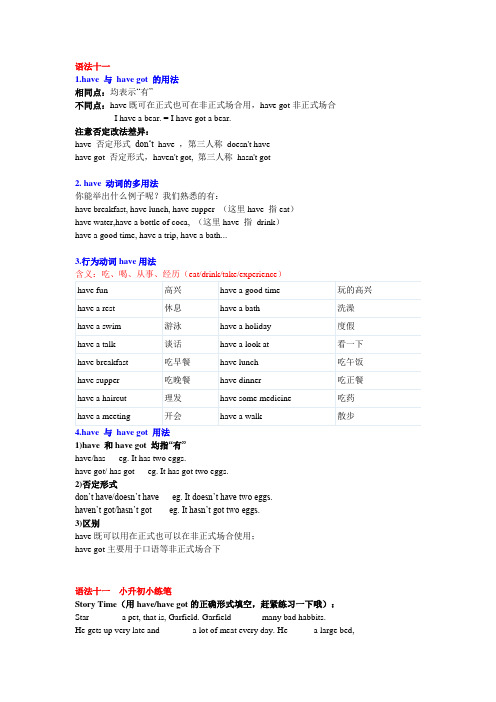
语法十一1.have 与have got 的用法相同点:均表示“有”不同点:have既可在正式也可在非正式场合用,have got非正式场合I have a bear. = I have got a bear.注意否定改法差异:have 否定形式don‘t have ,第三人称doesn't havehave got 否定形式,haven't got, 第三人称hasn't got2. have 动词的多用法你能举出什么例子呢?我们熟悉的有:have breakfast, have lunch, have supper (这里have 指eat)have water,have a bottle of coca, (这里have 指drink)have a good time, have a trip, have a bath...3.行为动词have用法4.have 与have got 用法1)have 和have got 均指“有”have/has eg. It has two eggs.have got/ has got eg. It has got two eggs.2)否定形式don’t have/doesn’t have eg. It doesn’t have two eggs.haven’t got/hasn’t got eg. It hasn’t got two eggs.3)区别have既可以用在正式也可以在非正式场合使用;have got主要用于口语等非正式场合下语法十一小升初小练笔Story Time(用have/have got的正确形式填空,赶紧练习一下哦):Star ______ a pet, that is, Garfield. Garfield ______ many bad habbits.He gets up very late and ______ a lot of meat every day. He______a large bed,so he has to sleep on the floor every night. What about you? _______you ______ a lovely pet?。
词法--have_got的详细用法

Have got 专项练习复习:have的用法及否定句、一般疑问句的变法。
①have的意思是:________,它的单三形式是:_______。
have是_______词。
例如:我有许多好朋友。
_____ _____ many good friends.他有许多好朋友。
_____ _____ many good friends.②把下列两道题改为否定句:1、I have many good friends:_____________________________总结:have 的句子改为否定句要_______________________________________________________________2、He has a dog:_________________________ 总结:has的句子改为否定句要_____________________________________同样的道理:请将下列两道题改为一般疑问句:I have many good friends:_____________________________ 总结:______________________________________He has a dog:_________________________ 总结:________________________________________________________练习:一、用have的正确形式填空:1、He _____ two brothers.2、I _____ a beautiful picture.3、Betty_____ a lovely dog.4、They _____ some friends here.二、请将下列的句子改为否定句和一般疑问句。
1-3题改为否定句:1、He has two brothers. ___________________________________________________2、I have a beautiful picture. ___________________________________________________3、Betty has some friends here. ___________________________________________________4-6题改为一般疑问句: 4、They have a good teacher. _________________________________肯定回答:_________________5、I have some cards. __________________________________________否定回答:____________________6、Tony has a sister. __________________________________________否定回答:____________________三、请用所给词的适当形式填空。
完整word版,have_havegot以及there_be的区别
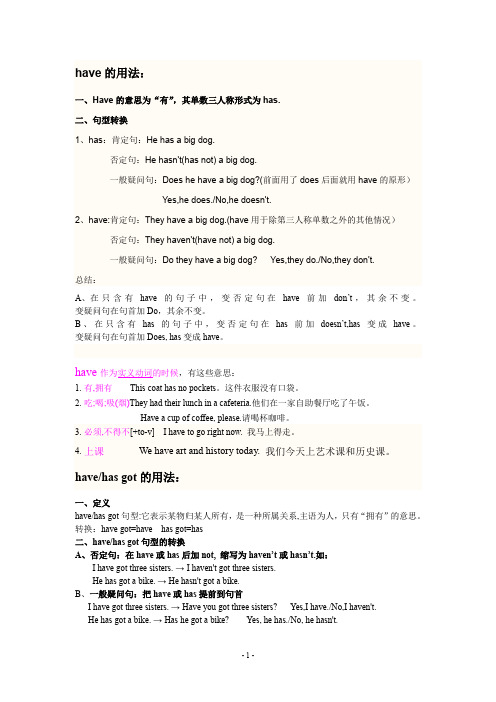
have的用法:一、Have的意思为“有”,其单数三人称形式为has.二、句型转换1、has:肯定句:He has a big dog.否定句:He hasn't(has not) a big dog.一般疑问句:Does he have a big dog?(前面用了does后面就用have的原形)Yes,he does./No,he doesn't.2、have:肯定句:They have a big dog.(have用于除第三人称单数之外的其他情况)否定句:They haven't(have not) a big dog.一般疑问句:Do they have a big dog? Yes,they do./No,they don't.总结:A、在只含有have的句子中,变否定句在have前加don’t,其余不变。
变疑问句在句首加Do,其余不变。
B、在只含有has的句子中,变否定句在has前加doesn’t,has变成have。
变疑问句在句首加Does, has变成have。
have作为实义动词的时候,有这些意思:1.有,拥有This coat has no pockets。
这件衣服没有口袋。
2.吃;喝;吸(烟)They had their lunch in a cafeteria.他们在一家自助餐厅吃了午饭。
Have a cup of coffee, please.请喝杯咖啡。
3.必须,不得不[+to-v] I have to go right now. 我马上得走。
4.上课We have art and history today. 我们今天上艺术课和历史课。
have/has got的用法:一、定义have/has got句型:它表示某物归某人所有,是一种所属关系,主语为人,只有“拥有”的意思。
转换:have got=have has got=has二、have/has got句型的转换A、否定句:在have或has后加not, 缩写为h aven’t或h asn’t.如:I have got three sisters. →I haven't got three sisters.He has got a bike. → He hasn't got a bike.B、一般疑问句:把have或has提前到句首I have got three sisters. →Have you got three sisters? Yes,I have./No,I haven't.He has got a bike. →Has he got a bike? Yes, he has./No, he hasn't.there be 句型一、定义there be句型是一常见的表示“存在”的句型。
英语have与have got的区别

*(一)、have与have got:建议查看《英语用法指南》(Practical English Usage, Michael Swan 著)第241条目have, have got表示占有,相互关系和其他状态实际上这涉及到have动词的三种用法,作助动词,作实义动词单用,以及have got。
虽然他们意思相同,但是用法存在一定差别(特别是地域性差别)一般来说,我们避免直接使用have形式(原文:“这看起来不自然”)在十分正式的英国英语里面,还可以使用Have you sth.?以及I haven't sth. ,这在美国英语是绝对不出现的。
在非正式文体中,have got更好但是have got形式不经常用在其他时态,比如I had got ,I will have got都比较少见。
但是可以与情态动词合用:She must have got a nice present.当我们表达重复性动作的时候,使用do+have的形式,而不是have got以上的用法以英国英语为标准。
如果在美国英语里面,do+have几乎是最常用的形式,口语中则会出现have got。
不过随着时间的推移,美国英语对英国英语影响越来越大,现在do+have的形式也经常被使用。
have和have got的区别尤其是在疑问句和否定句方面一、在英语口语中,常用have got 代替have ,作“有”解。
I have a bike. = I have got a bike.1.其否定式为:I don’t have a bike. = I haven’t a bike.I haven’t got a bike. (√)I don’t have got a bike. (×)2.其疑问形式为:Have you a bike? / Have you got a bike?Do you have a bike? (√)Do you have got a bike? (×)二、在下列情况下不能用have got来代替have。
词法--have_got的详细用法
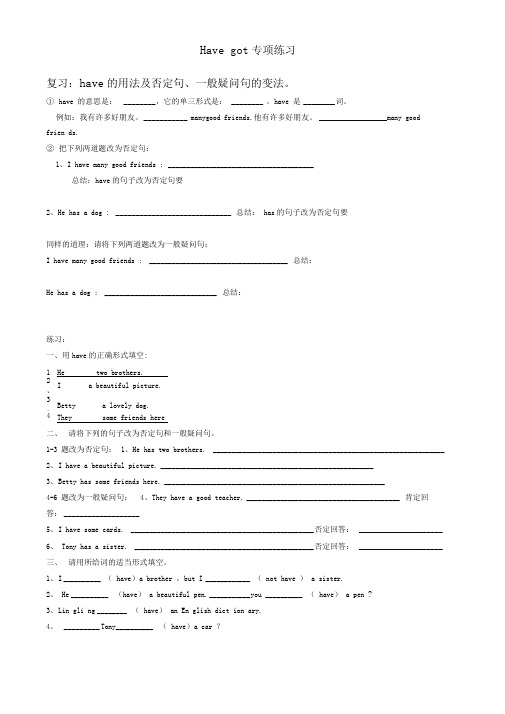
Have got专项练习复习:have的用法及否定句、一般疑问句的变法。
①have 的意思是:________ ,它的单三形式是:________ 。
have 是________ 词。
例如:我有许多好朋友。
___________ manygood friends.他有许多好朋友。
_________________many goodfrien ds.②把下列两道题改为否定句:1、I have many good friends : _______________________________________总结:have的句子改为否定句要2、He has a dog : _____________________________ 总结:has的句子改为否定句要同样的道理:请将下列两道题改为一般疑问句:I have many good friends : _____________________________________ 总结:He has a dog : ______________________________ 总结:练习:一、用have的正确形式填空:1He two brothers.2I a beautiful picture.、3、Betty a lovely dog.4They some friends here、二、请将下列的句子改为否定句和一般疑问句。
1-3 题改为否定句:1、He has two brothers. ______________________________________________________________2、I have a beautiful picture. _________________________________________________________3、B etty has some friends here. ___________________________________________________________4-6 题改为一般疑问句:4、They have a good teacher. _________________________________________ 肯定回答:___________________5、I have some cards. _________________________________________________ 否定回答:_____________________6、Tony has a sister. ________________________________________________ 否定回答:_____________________三、请用所给词的适当形式填空。
- 1、下载文档前请自行甄别文档内容的完整性,平台不提供额外的编辑、内容补充、找答案等附加服务。
- 2、"仅部分预览"的文档,不可在线预览部分如存在完整性等问题,可反馈申请退款(可完整预览的文档不适用该条件!)。
- 3、如文档侵犯您的权益,请联系客服反馈,我们会尽快为您处理(人工客服工作时间:9:00-18:30)。
have和have got
一、have
(一)have的用法及否定句、一般疑问句的变法
1、have的意思是:________,单数形式:_______,have是_______词。
例如:我有许多好朋友。
_____ _____ many good friends.
他有许多好朋友。
_____ _____ many good friends.
2、否定句
I have many good friends:_____________________________ have 的句子改为否定句要___ ___________ He has a dog:_________________________ has的句子改为否定句要_____________________
3、一般疑问句
I have many good friends:_____________________________
He has a dog:_________________________
(二)练习
1、用have的正确形式填空。
(1)He_____two brothers. (2)I_____a beautiful picture.
(3)Betty_____ a lovely dog. (4)They_____some friends here.
2、请将下列的句子改为否定句和一般疑问句。
改为否定句:
(1)He has two brothers. ___________________________________________________
(2)I have a beautiful picture. ___________________________________________________
(3)Betty has some friends here. ___________________________________________________
改为一般疑问句:
(4)They have a good teacher. _________________________________肯定回答:_________________
(5)I have some cards. __________________________________________否定回答:____________________
(6)Tony has a sister. __________________________________________否定回答:____________________
3、请用所给词的适当形式填空。
(1)I _________ (have)a brother,but I_________ (not have)a sister.
(2)He _________ (have)a beautiful pen. _________ you_________(have)a pen?
(3)Lingling _________ (have)an English dictionary.
(4)_________ Tony_________(have)a car?
二、Have got
(一)have got的用法及否定句、一般疑问句的变法
1、have got 表示________ 例:我有一只猫。
I have got a cat.have got 的第三人称单数形式是:_____ ______ have got可以缩写为:_______________ 例如:I have got a cat = ________________________
has got 可以缩写为:_______________ 例如:He has got a cat = ________________________
练习:请用has got或have got填空。
I a bike. He a bike. You a bike. Your sister a bike. We some books. Our teacher some books.
2、否定形式have got has got
3、一般疑问句
(二)练习
1、用have got的句型翻译。
(1)我有一个姐姐。
(2)我没有一个姐姐。
(3)你有一个姐姐吗?(4)他有一些卡片。
(5)他没有一些卡片。
(6)他有一些卡片吗?
2、请把下列句子改为否定句和一般疑问句。
改为否定句:
(1)I have got some books.
(2)She has got some books.
改为一般疑问句:
(3)I have got some fish. 肯定回答:
(4)He has got a dog. 否定回答:
总结:have、has与have got、has got的变成否定句和一般疑问句的区别:
1、have、has 变否定句要借助助动词或;
have got、has got 变成否定句则是在和的后面加,即:,。
2、have、has变成一般疑问句是要借助助动词或提到句首,并且要还原成。
have got、has got 变成一般疑问句是直接把或提到句首,后面照写。
注意:改成否定句和一般疑问句要把some改为any,改为一般疑问句出现第一人称I要改为第二人称you.。
